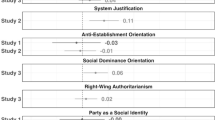Abstract
There has been a recent increase in interest in the psychological differences and antecedents related to political orientation. Personality, disgust sensitivity, attachment, and closeness to parents have all been found or have been theorized to be predictive of political orientation. These variables and the additional roles played by normative identity style and parental identification were examined. The results showed that normative identity style is associated with political orientation and that the role played by parental identification depends on the perceived parental political ranking, the gender of the parent, and the measure used to examine political orientation. No support was found for Lakoff’s (2002) model of parenting and political orientation.

Similar content being viewed by others
References
Alford, J. R., Funk, C. L., & Hibbing, J. R. (2005). Are political orientations genetically transmitted? American Political Science Review, 99, 153–167.
Berzonsky, M. D. (1989). Identity style: Conceptualization and measurement. Journal of Adolescent Research, 4(3), 268–282.
Berzonsky, M. D. (2004). Identity style, parental authority, and identity commitment. Journal of Youth and Adolescence, 33, 213–220.
Caprara, G. V., Barbaranelli, C., Consiglio, C., Picconi, L., & Zimbardo, P. G. (2003). Personalities of politicians and voters: Unique and synergistic relationships. Journal of Personality and Social Psychology, 84, 849–856.
Chirumbolo, A., & Leone, L. (2010). Personality and politics: The role of the HEXACO model of personality in predicting ideology and voting. Personality and Individual Differences, 49, 43–48.
Costantini, E., & Craik, K. H. (1980). Personality and politicians: California party leaders, 1960–1976. Journal of Personality and Social Psychology, 38, 641–661.
Dunkel, C. S., Papini, D. R., & Berzonsky, M. D. (2008). Explaining differences in identity styles: Possible roles of personality and family functioning. Identity, 8, 1–15.
Gosling, S. D., Rentfrow, P. J., & Swann, W. B., Jr. (2003). A very brief measure of the Big Five personality domains. Journal of Research in Personality, 37, 504–528.
Haidt, J., & Graham, J. (2007). When morality opposes justice: Conservatives have moral intuitions that liberals may not recognize. Social Justice Research, 20, 98–116.
Inbar, Y., Pizarro, D. A., & Bloom, P. (2009). Conservatives are more easily disgusted than liberals. Cognition and Emotion, 23, 714–725.
Jennings, M. K., & Niemi, R. G. (1968). The transmission of political values from parent to child. The American Political Science Review, 62, 169–184.
John, O. P., & Srivastava, S. (2001). The big-five trait taxonomy: History, measurement, and theoretical perspectives. In L. Pervin & O. P. John (Eds.), Handbook of personality: Theory and research (2nd ed.). New York: Guilford.
Jost, J. T. (2006). The end of the end of ideology. American Psychologist, 61, 651–670.
Jost, J. T., Glaser, J., Kruglanski, A. W., & Sulloway, F. (2003). Political conservatism as motivated social cognition. Psychological Bulletin, 129, 339–375.
Kossowska, M., & Van Hiel, A. (2003). The relationship between need for closure and conservative beliefs in western and eastern Europe. Political Psychology, 24, 501–517.
Lakoff, G. (2002). Moral politics (2nd ed.). Chicago: University of Chicago Press.
Marcia, J. E. (1966). Development and validation of ego-identity status. Journal of Personality and Social Psychology, 3(5), 551–558.
Mayseless, O., Wiseman, H., & Hai, I. (1998). Adolescents’ relationships with father, mother, and same-gender friend. Journal of Adolescent Research, 13, 101–123.
McAdams, D. P., Albaugh, M., Farber, E., Daniels, J., Logan, R. L., & Olson, B. (2008). Family metaphors and moral intuitions: How conservatives and liberals narrate their lives. Journal of Personality and Social Psychology, 95, 978–990.
Olatunji, B. O., Williams, N. L., Tolin, D. F., Abramowitz, J. S., Sawchuk, C. N., Lohr, J. M., & Elwood, L. S. (2007). The disgust scale: Item analysis, factor structure, and suggestions for refinement. Psychological Assessment, 19, 281–297.
Peterson, B. E., Smirles, K. A., & Wentworth, P. A. (1997). Generativity and authoritarianism: Implications for personality, political involvement, and parenting. Journal of Personality and Social Psychology, 72, 1202–1216.
Rozin, P., Lowery, L., Imada, S., & Haidt, J. (1999). The moral-emotion triad hypothesis: A mapping between three moral emotions (contempt, anger, disgust) and three moral ethics (community, autonomy, divinity). Journal of Personality and Social Psychology, 76, 574–586.
Simpson, J. A., Rhodes, W. S., & Phillips, D. (1996). Conflict in close relationships: An attachment perspective. Journal of Personality and Social Psychology, 71, 899–914.
Soenens, B., Duriez, B., & Goossens, L. (2005). Social-psychological profiles of identity styles: Attitudinal and social-cognitive correlates in late adolescence. Journal of Adolescence, 28, 107–125.
Tedin, K. L. (1974). The influence of parents on the political attitudes of adolescents. The American Political Science Review, 68, 1579–1592.
Thornhill, R., & Fincher, C. L. (2007). What is the relevance of attachment and life history to political values? Evolution and Human Behavior, 28, 215–222.
van Hiel, A., Kossowska, M., & Mervielde, I. (2000). The relationship between openness to experience and political ideology. Personality and Individual Differences, 28, 741–751.
Waterman, A. S. (1982). Identity development from adolescence to adulthood: An extension of theory and review of research. Developmental Psychology, 18, 341–358.
Weise, D. R., Pyszczynski, T., Cox, C. R., Arndt, J., Greenberg, J., Solomon, S., & Kosloff, S. (2008). Interpersonal politics: The role of terror management and attachment processes in shaping political preferences. Psychological Science, 19, 448–455.
Wheatley, T., & Haidt, J. (2005). Hypnotically induced disgust makes moral judgments more severe. Psychological Science, 16, 780–784.
Author information
Authors and Affiliations
Corresponding author
Rights and permissions
About this article
Cite this article
Dunkel, C.S., Decker, M. Using Identity Style and Parental Identification to Predict Political Orientation. Curr Psychol 31, 65–78 (2012). https://doi.org/10.1007/s12144-012-9131-8
Published:
Issue Date:
DOI: https://doi.org/10.1007/s12144-012-9131-8




